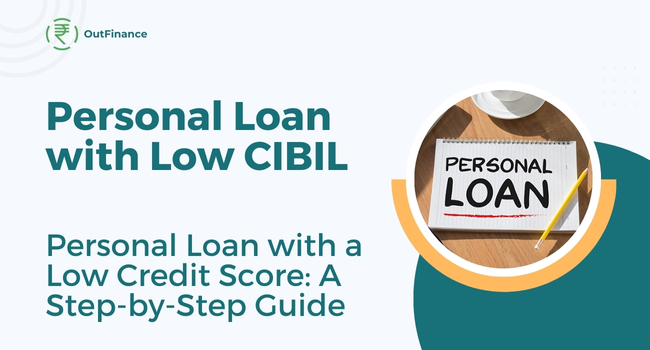Get a Personal Loan with a Low Credit Score: A Step-by-Step Guide

Whenever you need some urgent funds, 2 things come to mind. Call to friends and Personal loans. Because these are one of the easiest ways to get quick financial help in India. They can be used for various purposes like medical emergencies, debt consolidation, or even home renovations.
Funds from friends are the most beneficial because that will be mostly interest free and you can delay a bit as well, but if you didn’t get the help from friends, you need to go for the personal loan.
However, your credit score plays a crucial role in getting your personal loan approved. A low credit score can make it harder to secure a personal loan or may result in higher interest rates. But don’t worry—this OutFinance article will guide you through how to get a personal loan even with a low credit score in India.
What is a Credit Score?
A credit score is a three-digit number that represents your creditworthiness. It’s used by banks and financial institutions to decide whether you’re eligible for a loan and, if so, what interest rate to offer you.
Credit Score Range in India:
Good Score: 750 and above
Moderate Score: 650-749
Low Score: Below 650
Factors that affect your credit score include your repayment history, credit utilization, length of your credit history, and types of credit you have used. Frequent applications for loans can also negatively impact your score. Here you can know more about the tips to maintain a healthy credit score.
Challenges of Getting a Personal Loan with a Low Credit Score
In India, a low credit score makes it challenging to get personal loans due to these reasons:
Higher Interest Rates: Lenders consider applicants with low credit scores as high-risk borrowers, leading to higher interest rates.
Limited Loan Amounts: You may get approved for a smaller loan amount if your score is low.
Difficulty in Approval: Banks and traditional lenders might reject your application or conduct stricter eligibility checks. I’m explaining it last, but this will be the first problem with a low credit score. Most of the established banks will decline your loan application if your credit score is not good as per them.
Steps to Improve Your Chances of Getting a Personal Loan with a Low Credit Score
If you have a low credit score, don’t lose hope. Here are some strategies to increase your chances of getting a personal loan:
Apply with a Co-Applicant or Guarantor
A co-applicant or guarantor is someone who shares the loan responsibility with you. They can be your spouse, parent, or any family member.
How it helps: If the co-applicant or guarantor has a good credit score and stable income, the lender feels more confident in approving the loan. Their creditworthiness acts as a backup, improving your chances of approval.
Example: Suppose you have a low credit score of 620, but your spouse has a score of 800. Applying with your spouse as a co-applicant can boost your chances of getting the loan approved.
Opt for a Secured Personal Loan
A secured personal loan is backed by collateral, such as gold, property, or fixed deposits.
Why it works: Since you provide an asset as security, lenders are more willing to approve the loan, even with a low credit score.
Common collateral options: You can use gold, insurance policies, or fixed deposits as collateral.
Example: If you have a fixed deposit of ₹1 lakh, you can use it as collateral to get a secured personal loan despite a low credit score.
Improve Your Debt-to-Income Ratio
The debt-to-income (DTI) ratio is a measure of how much of your monthly income goes toward debt repayment. A lower DTI ratio indicates that you have a better repayment capacity.
How to improve: Try to pay off some existing debts or increase your income through part-time jobs or freelancing.
Example: If your monthly income is ₹50,000 and your total debt repayment is ₹30,000, your DTI ratio is 60%. By reducing your debt to ₹20,000, you improve your DTI to 40%, making you a better candidate for a personal loan.
Approach NBFCs and Fintech Lenders
Non-Banking Financial Companies (NBFCs) and fintech lenders often have more relaxed eligibility criteria compared to traditional banks. They focus more on your current income and repayment capacity rather than your credit score.
Why choose them: NBFCs and fintech companies offer quick processing, flexible eligibility, and lesser emphasis on credit scores.
Examples: Well-known NBFCs and fintech lenders like Bajaj Finserv, PaySense, and EarlySalary provide personal loans with easier criteria for approval.
Provide Proof of Stable Income
A stable income reassures lenders that you have the capacity to repay the loan, even if your credit score is low.
Documents to provide: Submit your salary slips, bank statements, income tax returns, or employment letters to show consistent income.
How it helps: Even with a low credit score, lenders may approve your loan if you demonstrate a strong income stream.
Apply for a Smaller Loan Amount
Starting with a smaller loan amount increases your chances of approval since it’s less risky for the lender.
Why it works: Lenders are more likely to approve smaller amounts as the repayment is easier to manage.
Example: If you need ₹5 lakhs but your credit score is low, try applying for ₹2 lakhs first. After repaying it consistently, you can apply for a larger amount later.
Build Your Credit Score Before Applying
If you can wait a little longer before applying, try to improve your credit score first:
Ways to improve:
Pay off outstanding debts.
Correct any errors in your credit report.
Use a credit card wisely—keep utilization below 30% and pay the full amount on time.
Timeline: You can generally see improvements in your credit score within 3 to 6 months with consistent efforts.
Documents Needed for Personal Loans with Low Credit Scores
To increase your chances of approval, ensure you have the necessary documents:
Basic Documents: ID proof (Aadhaar, PAN card), address proof (electricity bill, rental agreement), and recent passport-sized photographs.
Income Proof: Salary slips, bank statements for the last 6 months, or income tax returns.
Collateral Documents: If you’re applying for a secured loan, provide documents related to the collateral.
Co-Applicant/Guarantor’s Documents: If applicable, include ID proof, income proof, and a consent letter from the co-applicant or guarantor.
Mistakes to Avoid When Applying for a Loan with a Low Credit Score
Here are some common mistakes that can reduce your chances of getting a personal loan:
Applying to Multiple Lenders Simultaneously: Each application triggers a credit check, which can further lower your score.
Ignoring Hidden Charges: Check for processing fees, prepayment charges, or other hidden costs before finalizing the loan.
Not Reviewing Loan Terms Carefully: Make sure you understand the loan terms, including interest rates, penalties, and repayment period, to avoid surprises later.
Frequently Asked Questions (FAQs)
What is the minimum credit score needed for personal loans?
Most lenders prefer a score of 750 and above, but NBFCs and fintech lenders may accept lower scores.
Do all lenders approve personal loans for low credit scores?
No, some banks have strict requirements, but NBFCs and fintech companies are more flexible.
Can I negotiate the interest rate with a low credit score?
Yes, especially if you offer collateral or have a co-applicant with a good credit score.
Conclusion
Getting a personal loan with a low credit score in India is challenging, but not impossible.
You can improve your chances by applying with a co-applicant, opting for a secured loan, approaching NBFCs, or showing proof of stable income.
While working on these strategies, aim to improve your credit score for better financial options in the future. Remember, responsible borrowing and timely repayments are the keys to financial success.

0 Comments